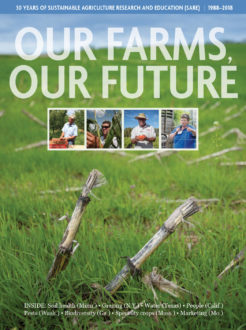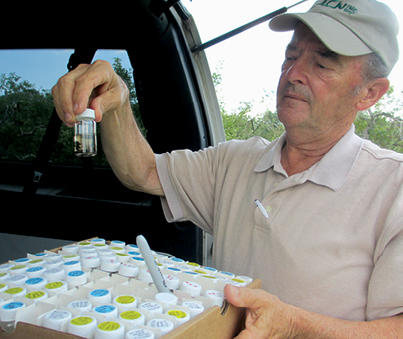Learn about SARE's broader impact on biodiversity in the United States.
Mark Schlueter, Georgia Gwinnett College
The Challenge
Honeybees play a critical role in agriculture by pollinating one third of the food we eat, yet our reliance on them creates considerable risk for both farmers and consumers. Disease, habitat loss and pesticide exposure contribute to extensive honeybee hive losses. The plight of the honeybee has increased the production cost for farmers who must rent hives and has created public concern about the security of our food system.
The Actions Taken
Farmers, beekeepers, researchers and others are tackling this challenge from many angles. One approach, which is the focus of Georgia Gwinnett College’s Mark Schlueter, is to better understand local native bee species and to support them on farms as alternative pollinators. Partnering with four Georgia apple growers, including the largest producer in the state, Schlueter has received five SARE grants to identify which native bees are best at pollinating apples and how farmers can manage habitat that helps them thrive. The strategies he is evaluating are to improve nesting habitat and to use wildflower plantings that provide bees with a year-round food source.
One of the farmers, Joe Dickey, has received two SARE grants to further study whether taking steps to support native bees on his 15-acre orchard will increase apple yields. So far, the answer has been yes.
The Impacts
A major impact of this research, Schlueter said, has been learning how native bees can stand in as alternative pollinators should honeybees become further imperiled. Specific impacts include:
- Increased production: In 2016, after establishing wildflower plots and seeing that they attracted a large number of native bees, Dickey’s harvest surged to 3,150 bushels from an average of 2,200 to 2,300 bushels the previous two years.
- The Georgia apple bee: After identifying dozens of bee species present in apple orchards and evaluating their effectiveness as pollinators, Schlueter found “the Georgia apple bee”—a mining bee that is the ideal pollinator for apple growers.
- Improved fruit quality: This mining bee spends up to 15 seconds at each apple blossom compared to the five seconds that a honeybee spends, according to Schlueter. “The better the pollination that apples get, the larger they grow and the higher their value,” he said.
Learn More
Visit the database of project reports to learn more about the SARE-funded projects conducted by Schlueter and Dickey.

